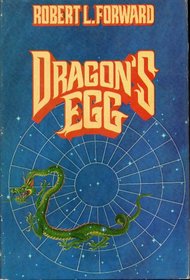Helpful Score: 1
This is qualified as hard sci-fi, although being written in 1980, some of the science is slightly out of date, although not badly. In the not-too-distant future, researchers at Caltech discover a star closer to Earth than any other, located just below the constellation Draco, hence the name Drgon's Egg. It's a neutron star--a collapsed star that is very, very small (about 20km across) and dense and not very bright. A few generations later humans send out a manned spaceship to investigate it more closely. What they discover shocks and amazes them: intelligent life on the surface of the star! Most of the story is told from the point of view of the cheela, the lifeforms on Dragon's Egg. How does life survive in a place with so much gravity that molecules can't even exist? This book is similar to Hal Clement's "Mission of Gravity" (written in 1953) only moreso. A very good read with lots of interesting science (including a 20-page appendix for more details) and lots of ideas to think about long after you're done reading. This book has a sequel, "Starquake," which I look forward to reading.
Helpful Score: 1
For those of you out there into sci-fi and who love a good other worldly novel...you may enjoy this book. Back reads: "Men could never live on such a star; only by the most advanced technology can humans exist in synchronous orbit to observe it. The sirface gravity is an incredible sixty-seven billion times that of Earth, with matter so compressed that the mass of a normal star is packed into a crusted sphere only twenty kilometers in diameter. A magnic field 2 trillion times that of Earth distorts the nuclei in the crust and out normal chemical reactions are replaced by neutron reactions. Yet on this impossible world, men detect intellegent life- the cheela, who live so fast the one of our hours is like 100 years in a human life. And as we follow the cheela, they struggle from savagery thru the beginings of agriculture and to the discovery of science. In this moving story we watch them establish contect with the humans orbiting above them. And for a time, men are their teachers. For a brief time...."




